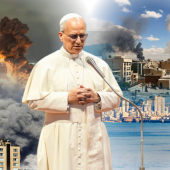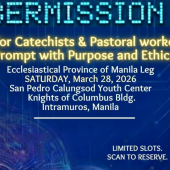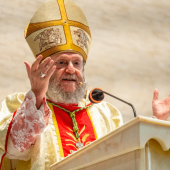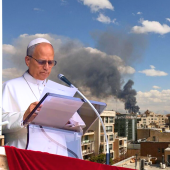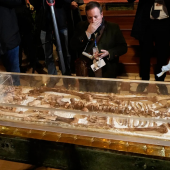Medical Experts at Vatican Explore the Promise and Perils of AI in Healthcare

Medical professionals, ethicists, and Church leaders gathered in the Vatican from November 10 to 12 for an international conference titled “AI and Medicine: The Challenge of Human Dignity.”
The event, organized by the International Federation of Catholic Medical Associations (FIAMC) and the Pontifical Academy for Life (PAV), explored how artificial intelligence (AI) is reshaping healthcare, and how the Church can help ensure that human dignity remains at the heart of this transformation.
According to Vatican News, the conference featured contributions from participants across the globe, including India, Latin America, Europe, and the United States, offering a truly international perspective on the opportunities and ethical challenges posed by AI in medicine.
Msgr. Renzo Pegoraro, Chancellor of the Pontifical Academy for Life, underscored the risk of reducing health and illness to mere data points. “The patient is a complex lived experience, made up of emotions, fears, and feelings,” he said. “The ability to personalize treatment remains an irreplaceable medical skill.”
He also cautioned against quick moral judgments about new technologies. “It’s not about labeling tools like ChatGPT as good or bad,” Msgr. Pegoraro said, “But about understanding how they function, whether they are transparent, fair, and free of bias.”
Dr. Otmar Kloiber, Secretary General of the World Medical Association, highlighted both the promise and the pitfalls of AI in clinical settings. He acknowledged its capacity to accelerate diagnoses, improve treatment precision, and personalize care, but also warned that excessive reliance on AI could weaken the doctor-patient relationship.
“Technology can invade our spaces, increase stress, and deepen social inequalities,” he cautioned. “AI must not become a low-cost replacement for genuine medical care.”

Professor Therese Lysaught, a member of the Pontifical Academy for Life, noted that artificial intelligence represents a new frontier even for Catholic bioethics. “Traditionally, bioethics reacts to developments,” she said. “Today, thanks to the Church’s leadership and the Pope’s encouragement, we can proactively engage these issues, recognizing the positive potential of AI.”
As reported by Vatican News, Lysaught emphasized that experiences shared during the conference, including from India and Catalonia, demonstrated how technology, when used responsibly, can expand access to healthcare and foster hope among medical professionals.
She also reflected on the deeper tension between “humanizing technology” and “mechanizing humanity.” Recognizing and addressing this balance, she said, is essential to ensuring that innovation serves people, not the other way around.
As the conference concluded, participants reaffirmed the Church’s vital role in guiding ethical reflection on new technologies, ensuring that in the age of artificial intelligence, the healing mission of medicine continues to honor the dignity of every human person.
Radio Veritas Asia (RVA), a media platform of the Catholic Church, aims to share Christ. RVA started in 1969 as a continental Catholic radio station to serve Asian countries in their respective local language, thus earning the tag “the Voice of Asian Christianity.” Responding to the emerging context, RVA embraced media platforms to connect with the global Asian audience via its 21 language websites and various social media platforms.









